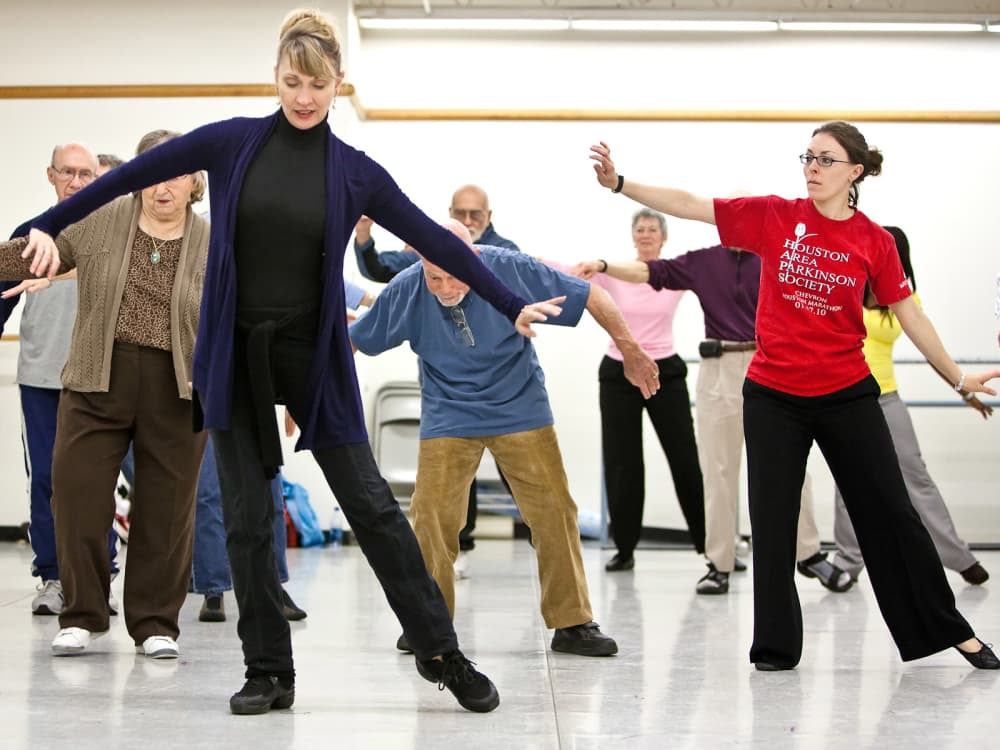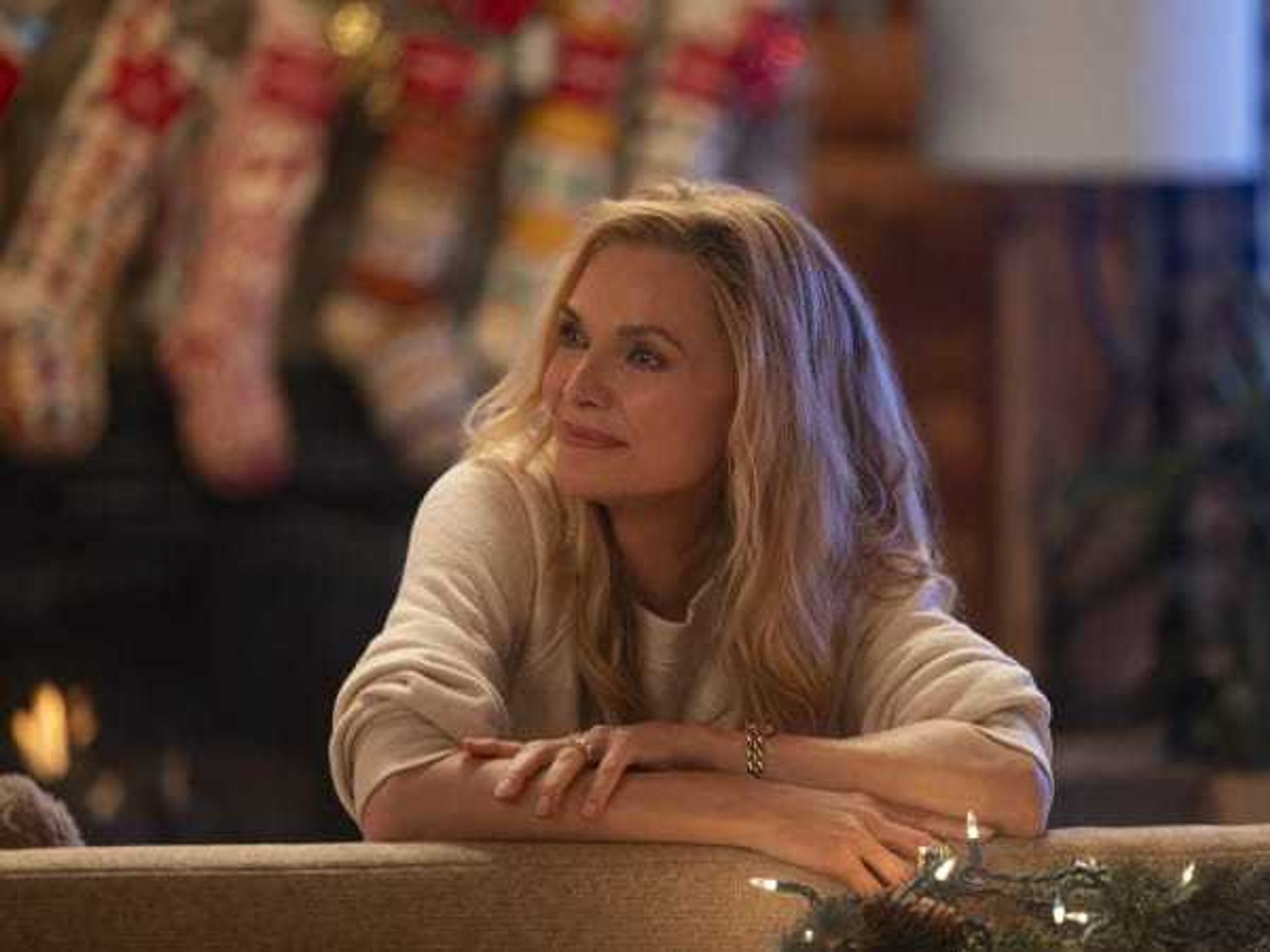The Arthropologist
Potent partnerships: Houston Ballet, HGO & SPA offer healing touch with uniquearts programs
 Dan Cossette of Ad Deum Dance lets boys be boys – or superheroes. Participantslearned movements like those of action figures as ways to express themselves.Photo by Nichole Pruitt
Dan Cossette of Ad Deum Dance lets boys be boys – or superheroes. Participantslearned movements like those of action figures as ways to express themselves.Photo by Nichole Pruitt Houston Ballet’s Kristine Richmond and HAPS' Kathleen Crist lead the Dance forParkinson’s class.Photo by Amitava Sarkar
Houston Ballet’s Kristine Richmond and HAPS' Kathleen Crist lead the Dance forParkinson’s class.Photo by Amitava Sarkar HAPS’s Kathleen Crist, far left, leads students in the Dance for Parkinson’sclass.Photo by Valerie Reeves/Art Institute of Houston North
HAPS’s Kathleen Crist, far left, leads students in the Dance for Parkinson’sclass.Photo by Valerie Reeves/Art Institute of Houston North Sarah Yarbrough instructs a group of kids how to make movement inspired by colorafter reading Dr. Seuss’ "My Many Colored Days" during the Bo’s Place SummerDaze program led by HGOco and Society for the Performing Arts.Photo by Nichole Pruitt
Sarah Yarbrough instructs a group of kids how to make movement inspired by colorafter reading Dr. Seuss’ "My Many Colored Days" during the Bo’s Place SummerDaze program led by HGOco and Society for the Performing Arts.Photo by Nichole Pruitt
When the curtain comes up on Houston Ballet and Houston Grand Opera (HGO), we may laugh, cry or simply marvel at the spectacular quality of two of our major arts institutions. And rightly so, as both are stellar pillars of Houston's cultural landscape. What you might not know is that world class performances is not all that they do. Besides housing top notch training programs, HGO studio and The Ben Stevenson Academy each runs numerous outreach programs that offer a chance to engage through dance and music.
Outreach programs that make a difference rarely come in a box. After a decade in the teaching artist biz, I know first-hand that children and adults alike can smell a canned outreach program a mile away. The best are culled from several key factors: Personal passions, artists willing to be co-creators in the process, on-the-ground tweaking and enough flexibility to take a serious look at how any given project impacts its participants.
Houston Ballet and HGO have forged potent partnerships with health and social service organizations, resulting in healing experiences for participants and teaching artists. These are outstanding outreach examples, quietly going on without much hoopla, that is, until the Arthropologist stopped by.
Every Saturday, a whole different crop of dancers shows up to class at Houston Ballet to study with former principal Krissy Richmond.
Houston Ballet's Dance for Parkinson's, which is based on Mark Morris Dance Group's (MMDG) program, all started with a walk in the woods. Managing Director Jim Nelson contemplated how he could make a difference while strolling in the forest. Nelson's father suffers from Parkinson's disease. "I wondered what I could do from my perspective, thinking about what we have available to us," Nelson remembers.
Around the same time, Richmond was contemplating moving back to Houston. In a confluence of events, Richmond had gone to visit a class at MMDG, and was ready to get on board with training. It helped that Kathleen Crist, director of social services at Houston Area Parkinson's Society, was well aware of the benefits of dance for her population. Research proves a strong tie between coordination and music and movement. Crist has been offering a tango class for a while now.
"It was as if the stars were aligned," says Crist about how all the pieces came together. "I bring my Parkinson's knowledge and Krissy brings her dance skills." Nelson, Richmond and Crist are firm in their conviction that the class is not therapy. "It's a dance class," says Nelson.
Richmond, a busy local actor and choreographer now, finds teaching this unique group of students keeps her on her toes in an entirely new way. "I am continually surprised by their bravery," says Richmond. "I try new things in class all the time, and I am shocked by how they jump and turn and do things I did not know they could do."
The class has been so successful that Houston Ballet has added a once a month singing class. So now Richmond, also a Broadway veteran, will be able to share her singing chops too.
I first heard about HGOco's collaboration with Bo'sPlace, called "Summer Daze," from Misha Penton, a frequent HGO chorus member and artistic director of Divergence Vocal Theater. "I am doing this thing at Bo's Place," Penton says in passing. "What thing? Who's Bo?" I asked Penton. Bo's Place, named for Lawrence Bosworth Neuhaus, is a bereavement center offering grief support for children, families and adults.
A week later, I found myself sitting across the dinner table from Sandra Bernhard, director of HGOco, the outreach arm of HGO. She mentions this intriguing program she's in the middle of. Suddenly, the pieces came together.
Bernhard first heard about Bo's Place at a meeting discussing possible outreach ideas. "What a beautiful mission," says Bernhard about the center. "I wondered, what could an opera company do here?" After a tour and meeting with Bo's Place program director Ann H. Weiss, the seeds for "Summer Daze" were born. The goals are straightforward: To facilitate the idea that even in the midst of loss it's possible to experience joy. Collaboration between the social services and the arts can be wonderful. "I jumped at the chance to work with HGO," says Weiss. "I knew immediately there was great possibility working with HGOco."
Both Bernhard and Weiss are firm believers that music and memory are linked. Both entered the process with open minds.
"This is an experiment. We didn't want to come in pretending that we knew what happens in a bereavement process. Every journey is different. We took that to heart," says Bernhard. "Artists come with ideas too, and we continually tweak the program."
Penton found the process both moving and challenging. "What's exciting for me as an artist is to see the kids take control of their own creative process, to see how empowering that is for them," says Penton. "They don't need anyone's permission to express themselves. With every creation project, they gain confidence in expressing their ideas. That's a big reminder for any artist, a true Ah-Ha moment, that's why I do what I do."
As movement is central to healing and creativity, Bo’s Place requested a movement component. Bernhard contacted Nichole Pruitt, education director at Society for the Performing Arts. Soon after, Randall Flinn of Ad Deum Dance Company was brought in to add the missing piece, and yet a new potent partnership was forged between SPA and HGO. "It has been wonderful how movement and arts can facilitate the hope and the healing to those who are bearing such grief and loss, to see the creative process to give them a chance to proceed," says Flinn.
Houston is full of potent partnerships like this happening between people and organizations who are willing to let an idea develop into something of meaning. The bottom line here in both of these enterprises is that the arts are not the exclusive domain of those marvelous artists who enchant us night after night. The arts belong to everyone.
One of the Houston Ballet participants summed it up perfectly. "Sometimes in these classes, I think they forget we have Parkinson's."
Exactly.
